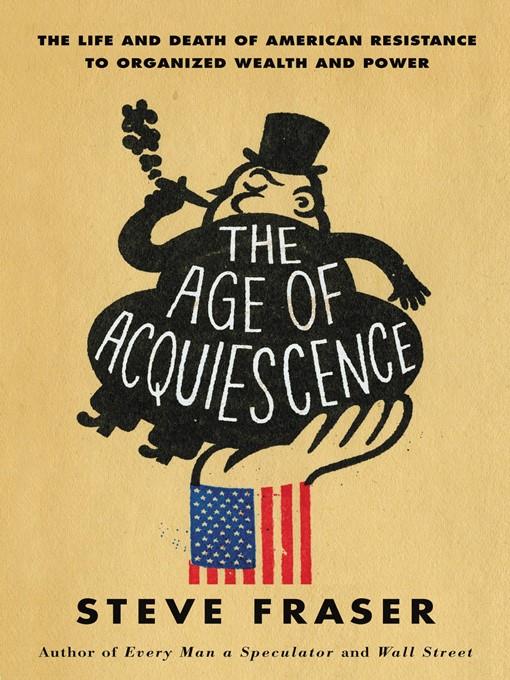
The Age of Acquiescence
The Life and Death of American Resistance to Organized Wealth and Power
کتاب های مرتبط
- اطلاعات
- نقد و بررسی
- دیدگاه کاربران
نقد و بررسی

November 10, 2014
Nowadays Americans just say yes to inequality and exploitation, argues this spirited history of anticapitalist sentiment in the United States. Historian Fraser (Every Man a Speculator) starts with an absorbing, vigorous account of class politics during the late 19th-century Gilded Age, a time of mass strikes, revolutionary agitation, utopian socialist yearnings and fierce denunciations of robber barons among workers, and violent repression and apocalyptic alarm among elites. He then contrasts that era with the post-Reagan “second Gilded Age,” when ordinary people have seen incomes erode, work hours lengthen, economic security dwindle, and corporations run riot, yet have uttered, he argues, hardly a peep of protest. Less focused than his remembrance of 19th-century resistance, Fraser’s take on modern acquiescence scolds capitalist ideologies and cultural tropes—the businessman as populist hero, consumerism as freedom itself—for imparting false consciousness. Many of his analyses, like his diagnosis of right-wing populism as a rebellion of “family capitalism,” are incisive, but he ignores important prosaic factors, like the disastrous record of 20th-century socialist economies, in the waning of utopian left-wing enthusiasm. Still, this is an excellent, very readable recreation of an authentically American form of working-class militancy and its eclipse.

December 15, 2014
Working men and women died for the eight-hour workday, and the thanks they get is the silence of lambs. It wasn't long ago, writes labor historian Fraser (Every Man a Speculator: A History of Wall Street in American Life, 2005, etc.), that "the labor question" was a matter of incendiary discussion. The 19th century saw countless efforts, for instance, to create a balance of industrial and agricultural enterprise, many of them based on a post-Jeffersonian notion of empowered freeholders and independent producers. The market economy that emerged instead was likely to beget inequality and poverty, before "the antiseptic, mathematical language of risk assessment and probability analysis made that seem overly sentimental." Taking his narrative through the Jeffersonian era and the first Gilded Age to the present, Fraser charts a steady diminution of workers' rights and the value of labor. He can be a little heavy-handed, especially when pillorying Ronald Reagan: "the Great Communicator's reign...unleashed torrents of mercenary greed." Some readers may find this off-putting, but others, used to a diet of Chris Hedges, may well find it exhilarating instead. Fraser's careful analysis of the rise of the "rentier society" of that time helps make up for rhetorical excess, and especially useful is his look at how the anti-usury laws of old gave way to a time of financial deregulation, which allowed for an all-out assault on the wallets of those who lived on credit. And surely Fraser is right when he notes the damaging effects of false consciousness, as when even the labor movement insists on being seen as representing the middle class "in a studied aversion to using a social category-the working class-that fits it well but is now so stigmatized that it is better left buried." A welcome though overly broad-brushed excoriation of the age of the ascendant 1 percent.
COPYRIGHT(2014) Kirkus Reviews, ALL RIGHTS RESERVED.

Starred review from January 1, 2015
In this comparative history, Fraser (Every Man a Speculator; Labor Will Rule) contrasts the Gilded Age with post-Great Recession America and wonders why there hasn't been more protest against growing wealth disparity. The author explains how 19th-century industrialization caused immense social disruption. Resulting worker backlash, he writes, brought about the legislation and contractual agreements that both curbed capitalism's excesses and created prosperity for most Americans by the 1950s. Fraser takes a dystopian view of the last few decades when he says the export of jobs and investment eviscerated American industry, collapsed cities, shortened life expectancy, and created downward social mobility. He ascribes the general acceptance of the current economic order to factors including the media, consumer culture, job competition, an erosion of worker rights, declining unions, and the fragmentation of the working class. VERDICT Fraser's work shines as an angry but cogent denouncement of America's growing wealth disparity. It is highly recommended to all readers as a complement to Thomas Piketty's study of wealth inequality, Capital in the Twenty-First Century. [See Prepub Alert, 8/11/14.]--Lawrence Maxted, Gannon Univ. Lib., Erie, PA
Copyright 2015 Library Journal, LLC Used with permission.

Starred review from December 15, 2014
Why did the Occupy Wall Street movement, seen as the rambunctious protest against the nation's second Gilded Age, vanish so suddenly and completely? And what does its disappearance say about our ability to recognize and rebel against inequality? Fraser (Every Man a Speculator, 2005) examines these compelling questions as he contrasts the Gilded Age of the nineteenth century and our latest era of inequality. Among his observations: the earlier protests against wealth and power came from a population new to capitalism and outraged by its excesses, unlike our generation, long familiar with capitalism. Fraser notes that the earlier age was a time when industrialization was sweeping the nation, unlike the present, with its lack of industrialization. Americans then were frugal and hardworking; now they are spendthrifts satisfying every impulse with borrowed money. Fraser also explores the difference between a time when the Left rose up against the powers that be and now, when the Right's Tea Party rails against the government but supports capitalism. All the while, he raises the most compelling question, Is capitalism compatible with democracy, as the U.S. has always asserted? This is a sharp-edged, completely fascinating look at American history and the contemporary politics of the haves and have-nots.(Reprinted with permission of Booklist, copyright 2014, American Library Association.)

























دیدگاه کاربران